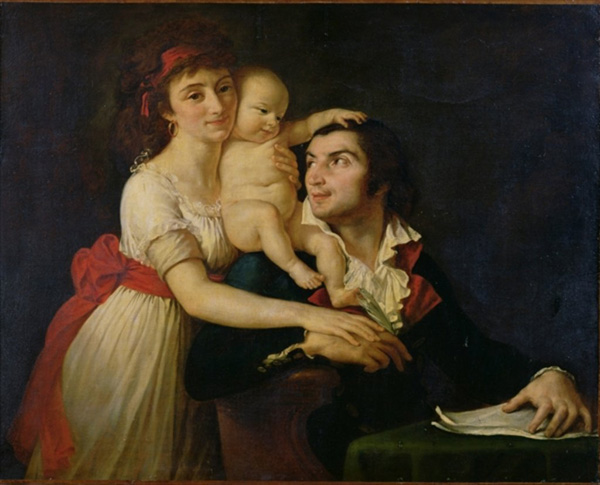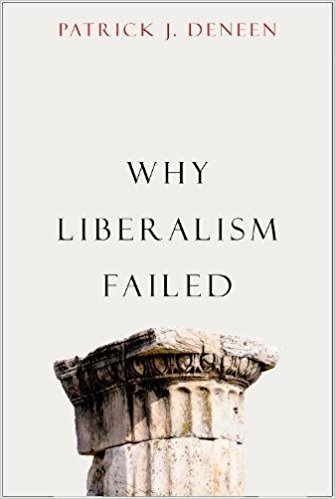By Shmuel Ben-Gad (July 2018)

Camille Desmoulins his Wife Lucile and their son Horace-Camille, Jacques Louis David, 1792. Camille and Lucile Desmoulins, and son. Desmoulins, an early Jacobin and French revolutionary hard-liner later called for an end of the Terror and for clemency for those accused. He was denounced and executed by his friend Robespierre in 1794. Innocently, Lucille requested that Robespierre save her husband but she too was executed by the Revolutionary Tribunal. Robespierre had been a witness at their wedding several years previously.
Patrick J. Deneen’s timely book is an important contribution to our understanding of what is happening in American and European politics. In Why Liberalism Failed (Yale University Press, 248 pp), Deneen uses the word liberalism, not as it is largely used in the U.S. to mean the American equivalent of European social democracy, but as it is used in academia and many other countries to mean a political ideology that posits the existence of natural rights for all human beings. In this sense, we find it in the American Declaration of Independence, the French Revolution’s Declaration of the Rights of Man, and the U.N.’s Universal Declaration of Human Rights.
The book itself is a clear critique of liberalism. Deneen argues that liberalism redefined liberty, that in pre-modern Europe “liberty” was considered self-governance both of the individual and of the political unit. The natural law morality of certain Greco-Roman philosophies that was also adopted by mediaeval Christianity viewed human beings as part of nature and human nature itself having an end or purpose,  the fulfillment of which resulted in human flourishing. This required a recognition of limits and the practice of self-limitation so as not to become enslaved by the passions. This self-limitation was achieved through the practice of the virtues. Just as liberty of the individual was the avoidance of the tyranny of the passions, the liberty of the political unit was the avoidance of the rule of tyrants through the practice of virtue.
the fulfillment of which resulted in human flourishing. This required a recognition of limits and the practice of self-limitation so as not to become enslaved by the passions. This self-limitation was achieved through the practice of the virtues. Just as liberty of the individual was the avoidance of the tyranny of the passions, the liberty of the political unit was the avoidance of the rule of tyrants through the practice of virtue.
Liberalism, says Deneen, redefined liberty to mean the state of being allowed to do whatever one wanted as long as one did not physically harm another. There was no orientation to an overriding human good. Thus, while pre-modern political thought ascribed a great value to local communities, civic associations, religious bodies, and the family as places where the virtues might be cultivated, liberalism tends to see these as arbitrary encumbrances on autonomous human beings and obstacles to the liberty of human beings. The stronger a triumphant liberalism’s emphasis on rights and personal autonomy grows, the weaker these institutions become. People are more inclined to become slaves to their passions, behaving selfishly and thinking in terms of short-term pleasures. Liberalism encourages people to be cut off from one another and to have weaker links to past and future generations. Liberalism recognizes no limits and thus encourages vice and folly.
But, continues Deneen, a society rife with selfishness inevitably experiences crises and the only entity that can deal with the crises—given the weakening of self-restraint of the citizenry—is a powerful, often distant, centralized government that increasingly regulates the lives of the citizens. Thus liberalism, which aims at increasing the areas of life in which people can do as they please, winds up with an increasingly intrusive state. At the same time, a fairly laissez faire market economy homogenizes and globalizes society and weakens “distinctive economic cultures.” The financial crisis that began in 2008 started because of mortgage-backed securities. Where mortgages used to be offered by banks that were embedded in local communities and that fostered relationships with its local clientele, the nationalized, even globalized, economy adopted mortgage-backed securities that were abstract with only formal, legal connections between lenders and borrowers not substantive, knowledgeable connections.
Thus, the author points out that while the left’s liberalism claims to favor economic security and the reduction of economic inequality, in reality its accomplishments are mostly limited to lifestyle (especially sexual) autonomy; and while the right’s liberalism claims to fight for family-oriented values and states’ rights, its accomplishments are mainly limited to economic deregulation and globalization. Deneen asks, “Is it mere coincidence that both parties, despite their claims to be locked in a political death grip, mutually advance the cause of autonomy and inequality?”
Liberalism fails because the type of human beings it fosters are selfish with little regard for the common good. They are encouraged to satisfy their passions; but human passions are limitless and so, for example, debt—national and personal—becomes excessive.
Deneen believes things are reaching a crisis point where liberalism will be seen not to work. He thinks this may result in an increasingly authoritarian, anti-democratic liberal elite that imposes its will upon society (e.g., European Union) or a populist or military authoritarianism. He does not seem to think that any of these will offer a solution to liberalism but regards the destruction that liberalism has wrought as so vast that the recovery from it will take a very long time.
As to recovery, he recommends the forming of small intentional communities, religious or not, as an alternative to “the cold, bureaucratic, and mechanized world liberalism offers.” He does not romanticize local communities but he thinks that with their human connections they offer the possibility of fostering practices rooted in substantive human good and natural law morality and that, eventually, an alternative political philosophy to liberalism might arise from these communities of practice.
Patrick J. Deneen’s book is clearly argued, and rich in ideas. His determination to make manifest the essence of liberal ideology and its deleterious effects is enlightening. Readers will never be able to look upon liberalism in quite the same way again.
_________________________________________
Shmuel Ben-Gad is a librarian at George Washington University and a book reviewer for Library Journal and the Association of Jewish Libraries.
Follow NER on Twitter @NERIconoclast
- Like
- Digg
- Del
- Tumblr
- VKontakte
- Buffer
- Love This
- Odnoklassniki
- Meneame
- Blogger
- Amazon
- Yahoo Mail
- Gmail
- AOL
- Newsvine
- HackerNews
- Evernote
- MySpace
- Mail.ru
- Viadeo
- Line
- Comments
- Yummly
- SMS
- Viber
- Telegram
- Subscribe
- Skype
- Facebook Messenger
- Kakao
- LiveJournal
- Yammer
- Edgar
- Fintel
- Mix
- Instapaper
- Copy Link






